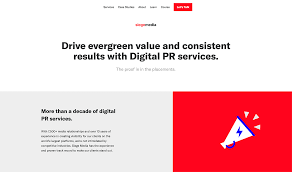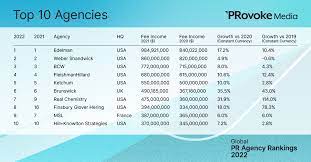The Power of PR: Building Trust and Enhancing Reputation
In today’s fast-paced and highly competitive business landscape, establishing a strong brand reputation is essential for success. Public Relations (PR) plays a crucial role in shaping public perception, building trust, and maintaining positive relationships with key stakeholders.
PR is much more than just media relations or press releases. It encompasses a strategic approach to managing communication between an organization and its target audience. By effectively utilizing various PR tactics, businesses can enhance their reputation, establish thought leadership, and ultimately drive growth.
One of the core functions of PR is managing media relations. A well-crafted press release or a compelling story pitched to journalists can generate valuable media coverage, increasing brand visibility and credibility. Positive media coverage not only helps businesses reach a wider audience but also positions them as industry experts.
Beyond media relations, PR involves proactive reputation management. This includes monitoring online conversations about the brand, addressing any negative sentiment promptly, and engaging with customers and stakeholders through social media platforms. By actively participating in these conversations, businesses can demonstrate transparency and build trust with their target audience.
Another important aspect of PR is crisis communication. In times of unexpected events or issues that may negatively impact a company’s image, effective crisis management becomes crucial. PR professionals are adept at handling crises by providing timely and accurate information to the public, managing stakeholder expectations, and mitigating reputational damage.
PR also plays a significant role in building thought leadership within an industry. By positioning key executives as experts through speaking engagements at conferences or contributing articles to relevant publications, businesses can establish themselves as go-to sources for industry insights. This not only enhances their reputation but also opens doors to new opportunities for growth.
Moreover, PR helps businesses navigate the increasingly influential world of social media influencers. Collaborating with relevant influencers who have a strong following can amplify brand messages and reach new audiences organically. Partnering with influencers who align with the company’s values and target audience can enhance brand credibility and drive engagement.
In today’s era of information overload, consumers are more discerning than ever before. They seek authentic and transparent brands that align with their values. This is where PR shines by crafting compelling narratives that resonate with the target audience, showcasing a company’s unique story and values.
PR is not a one-time effort but rather an ongoing process. It requires strategic planning, consistent messaging, and continuous evaluation to ensure that communication efforts are aligned with business goals. By investing in PR, businesses can build long-term relationships with their stakeholders, foster brand loyalty, and ultimately drive business growth.
In conclusion, PR is a powerful tool for businesses to shape public perception, build trust, and enhance reputation. From media relations to crisis communication and thought leadership strategies, PR professionals play a pivotal role in helping businesses navigate the complex communication landscape. By embracing the power of PR, businesses can create a positive impact on their brand image and achieve long-term success in today’s highly competitive market.
5 Essential PR Tips: Mastering Your Audience, Setting Goals, Channel Diversity, Creativity, and Performance Monitoring
- Know your target audience
- Set measurable goals
- Utilise multiple channels
- Be creative
- Monitor performance
Know your target audience
One of the fundamental principles of successful Public Relations (PR) is understanding your target audience. Knowing your audience allows you to tailor your communication efforts and messages to resonate with them effectively. By gaining insights into their preferences, needs, and values, you can create impactful PR campaigns that capture their attention and build meaningful connections.
To begin, conduct thorough research on your target audience. Identify demographic information such as age, gender, location, and socioeconomic background. This data will help you understand their characteristics and tailor your messaging accordingly. Additionally, delve deeper into their interests, behaviours, and media consumption habits. Understanding these nuances will enable you to choose the most suitable channels to reach them effectively.
Once you have a clear picture of your target audience, develop key messages that align with their values and aspirations. Craft compelling narratives that address their pain points or offer solutions to their problems. By speaking directly to their needs and desires, you can establish a strong connection that resonates with them on a personal level.
Moreover, consider the tone and language you use in your PR efforts. Adapt your communication style to match the preferences of your target audience. For example, if you’re targeting a younger demographic, a more informal and conversational tone might be appropriate. On the other hand, if you’re targeting professionals in a specific industry, a more formal tone may be required.
In addition to tailoring content for your target audience, it’s essential to select the right channels for distribution. If your audience primarily consumes information through social media platforms like Instagram or TikTok, focus on creating engaging visual content for these channels. Conversely, if they prefer traditional media outlets such as newspapers or television news programs, ensure that your PR efforts include press releases or media pitches targeted at these outlets.
Regularly review and analyze data on audience engagement and response to gauge the effectiveness of your PR strategies. Monitor metrics such as website traffic, social media interactions (likes, comments), and media coverage. This data will provide valuable insights into which tactics are resonating with your target audience and help you refine your future PR campaigns.
In summary, knowing your target audience is a crucial aspect of successful PR. By understanding their characteristics, preferences, and values, you can tailor your messages and choose the most effective communication channels. This targeted approach will enable you to build strong connections with your audience, enhance brand loyalty, and achieve your PR objectives.
Set measurable goals
Setting Measurable Goals: The Key to Successful PR Campaigns
When it comes to Public Relations (PR), having a clear set of goals is essential for a successful campaign. Setting measurable goals not only provides direction and focus but also allows you to track progress and evaluate the effectiveness of your PR efforts.
The first step in setting measurable goals is to define what you want to achieve. Are you looking to increase brand awareness, improve reputation, drive website traffic, or generate leads? By identifying specific objectives, you can tailor your PR strategies accordingly.
Once you have defined your goals, it’s important to make them measurable. This means attaching numbers or specific metrics to each goal. For example, instead of aiming for “increased brand awareness,” set a goal like “increase social media followers by 20% within three months” or “secure coverage in at least five industry publications.”
Measurable goals provide clarity and enable you to track progress over time. They provide a benchmark against which you can assess the success of your PR activities. By regularly monitoring key performance indicators (KPIs) such as website traffic, media mentions, social media engagement, or lead generation, you can gauge the impact of your efforts and make adjustments as needed.
Setting measurable goals also helps in allocating resources effectively. By knowing what you want to achieve and having specific metrics in place, you can allocate budgets, time, and manpower accordingly. This ensures that your PR activities are focused on achieving tangible results rather than just going through the motions.
Moreover, measurable goals allow for accountability and transparency. When everyone involved in the PR campaign understands the objectives and metrics being measured, it becomes easier to assess individual contributions and celebrate achievements collectively. It also enables open communication between team members and stakeholders regarding progress towards the set goals.
In addition to tracking progress towards your goals, it’s important to regularly evaluate the outcomes achieved. This involves analyzing data and insights gathered throughout the campaign to identify what worked well and what can be improved. By understanding the impact of your PR efforts, you can refine your strategies for future campaigns and continuously optimize your approach.
In conclusion, setting measurable goals is a fundamental aspect of successful PR campaigns. By defining clear objectives and attaching specific metrics to them, you can track progress, allocate resources effectively, and evaluate the impact of your PR activities. Measurable goals provide direction, focus, and accountability, ultimately leading to more impactful PR outcomes. So, before embarking on your next PR campaign, take the time to set measurable goals that will guide you towards success.
Utilise multiple channels
Utilise Multiple Channels: Maximising the Reach of your PR Efforts
In the age of digital communication, it is essential for businesses to embrace multiple channels when implementing their PR strategies. Utilising various platforms and mediums not only expands the reach of your message but also allows you to engage with a wider audience and maximise the impact of your PR efforts.
Gone are the days when traditional media outlets were the sole means of disseminating information. While they still hold value, businesses now have a plethora of channels at their disposal to communicate their message effectively. From social media platforms to online publications, podcasts, blogs, and even influencer partnerships, the options are vast.
Social media platforms like Facebook, Twitter, Instagram, LinkedIn, and YouTube offer immense potential for reaching and engaging with target audiences directly. These platforms allow businesses to share news updates, company achievements, thought leadership content, and engage in real-time conversations with customers and stakeholders. By utilising these channels strategically, businesses can build brand awareness and foster meaningful connections.
Online publications and blogs provide an opportunity to showcase expertise through guest articles or interviews. Contributing valuable content to industry-specific websites or publications not only positions your business as a thought leader but also exposes your brand to a wider audience that trusts those platforms for information.
Podcasts have gained significant popularity in recent years as an effective medium for storytelling and sharing insights. Appearing as a guest on relevant podcasts or even starting your own podcast can help you reach a dedicated audience interested in your industry or niche.
Collaborating with influencers who align with your brand values can also be a powerful way to amplify your PR efforts. Influencers have built loyal followings who trust their recommendations. Partnering with them allows you to leverage their influence and tap into their engaged audience base.
It is important to note that while embracing multiple channels is crucial, it is equally important to tailor your message according to each platform’s unique characteristics. Each channel has its own audience demographics, communication style, and content format. By customising your message to suit each channel, you can ensure that it resonates with the intended audience and maximises engagement.
In conclusion, utilising multiple channels is a key aspect of modern PR strategies. By diversifying your communication efforts across various platforms, businesses can expand their reach, engage with a wider audience, and increase the impact of their PR campaigns. Whether through social media platforms, online publications, podcasts, or influencer collaborations, embracing multiple channels allows businesses to effectively communicate their message and build a strong brand presence in today’s digital landscape.
Be creative
Be Creative: Unleashing the Power of Innovative PR Strategies
In the world of Public Relations (PR), creativity is a powerful tool that can set businesses apart from their competitors. By embracing a creative mindset, PR professionals can develop innovative strategies that capture attention, engage audiences, and leave a lasting impact.
Creativity in PR goes beyond thinking outside the box. It involves finding unique ways to tell a brand’s story, creating memorable experiences for target audiences, and leveraging emerging trends and technologies to deliver messages effectively.
One way to unleash creativity in PR is through compelling storytelling. Rather than simply relaying facts and figures, PR professionals can craft narratives that evoke emotions and connect with people on a deeper level. By weaving together captivating stories, brands can create an emotional connection with their audience, making them more likely to remember and engage with the brand.
Another avenue for creativity in PR is through experiential campaigns. Instead of relying solely on traditional media channels, businesses can create immersive experiences that allow consumers to interact with their brand firsthand. Whether it’s hosting an event, launching a pop-up shop, or organizing a unique activation, experiential campaigns provide opportunities for brands to make a lasting impression and generate buzz.
In today’s digital age, social media platforms offer endless possibilities for creative PR strategies. From viral videos to interactive content and influencer collaborations, social media provides an avenue for brands to showcase their personality and engage directly with their target audience. By embracing new trends and adapting content specifically for each platform, businesses can effectively communicate their message in creative ways that resonate with their audience.
Furthermore, incorporating emerging technologies into PR campaigns can elevate creativity to new heights. Virtual reality (VR), augmented reality (AR), live streaming, and interactive tools offer exciting opportunities to captivate audiences and deliver immersive experiences. By integrating these technologies strategically into PR initiatives, brands can leave a lasting impression on consumers while showcasing their innovative nature.
It’s important to remember that creativity in PR should always align with the brand’s values and objectives. While thinking outside the box is encouraged, it should be done in a way that maintains brand consistency and authenticity. Creativity should enhance the brand’s image and resonate with its target audience, rather than being creative for the sake of being different.
In conclusion, creativity is a powerful asset in the world of PR. By embracing innovative approaches to storytelling, experiential campaigns, social media engagement, and emerging technologies, brands can create memorable experiences that capture attention and foster meaningful connections with their audience. With creativity as a driving force, PR professionals can unlock new possibilities and achieve remarkable results for their clients or businesses. So, let your imagination run wild and unleash the power of creativity in your PR strategies!
Monitoring Performance: The Key to Effective PR Strategies
In the dynamic world of Public Relations (PR), monitoring performance is a crucial aspect that should never be overlooked. By regularly tracking and evaluating the impact of PR efforts, businesses can gain valuable insights, make data-driven decisions, and refine their strategies for maximum effectiveness.
One of the primary reasons to monitor performance in PR is to assess the reach and impact of communication efforts. By measuring media coverage, social media engagement, website traffic, and other relevant metrics, businesses can gauge how well their messages are resonating with their target audience. This allows them to understand which tactics are working and which ones may need adjustment.
Monitoring performance also enables businesses to identify potential issues or negative sentiment early on. By keeping a close eye on online conversations and social media mentions, companies can promptly address any concerns or misinformation that may arise. Timely response not only helps mitigate reputational damage but also demonstrates a commitment to transparency and customer satisfaction.
Furthermore, monitoring performance provides an opportunity for benchmarking against competitors. By comparing PR metrics with industry peers, businesses can gain valuable insights into their market position and identify areas for improvement. Understanding how competitors are performing in terms of media coverage, online presence, or thought leadership can help shape future PR strategies.
Another benefit of monitoring performance is the ability to measure the return on investment (ROI) of PR activities. By attributing specific outcomes such as increased brand awareness, website conversions, or lead generation to PR efforts, businesses can demonstrate the value that PR brings to their overall marketing strategy. This information is invaluable when it comes to allocating resources effectively and justifying PR budgets.
To effectively monitor performance in PR, businesses should establish clear goals and key performance indicators (KPIs) at the outset. These could include metrics such as media mentions, social media engagement rates, website traffic from PR-related sources, or customer feedback surveys. Regularly tracking these metrics using tools like media monitoring software, web analytics, and social media listening platforms can provide real-time insights into PR performance.
In conclusion, monitoring performance is a critical component of successful PR strategies. By regularly evaluating the impact of communication efforts, businesses can make informed decisions, identify areas for improvement, and demonstrate the value of PR to key stakeholders. With data-driven insights at their disposal, companies can refine their PR tactics, enhance brand reputation, and ultimately drive business growth in today’s competitive market.











